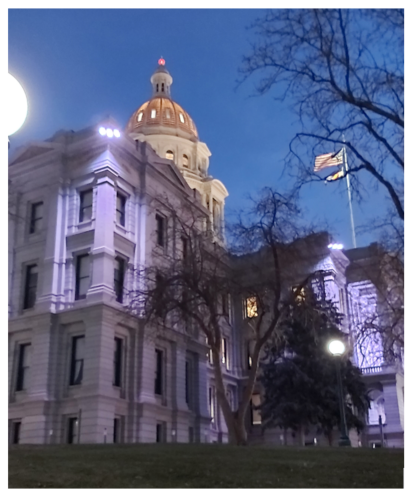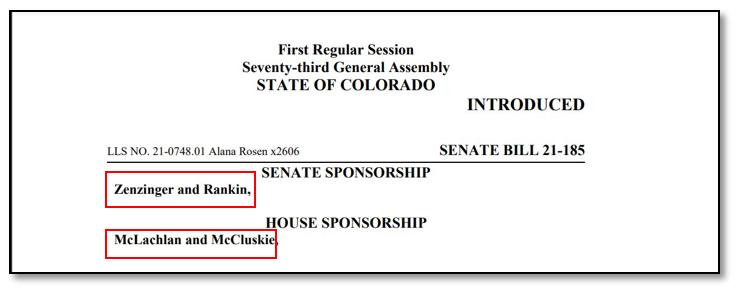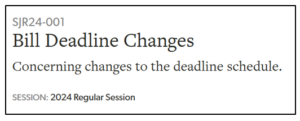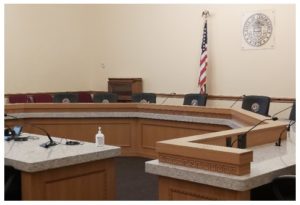 Happy New Year!
Happy New Year!
We wish you a happy and healthy 2025.
The First Regular Session of the Seventy-fifth General Assembly will convene at 10 a.m. on Wednesday, January 8.
An informational and educational resource for the Colorado General Assembly by the Office of Legislative Legal Services.
by Richard Sweetman
On June 25, 2020, protesters pulled down the statue of the civil war soldier that stood atop the pedestal monument near the west steps of the Colorado capitol. Since that day, legislators and members of the American Indian community have discussed a replacement monument. But, to this day, the space where the civil war soldier statue once stood remains empty.
The original plan to replace the civil war soldier with a statue of an American Indian woman mourning the events of the Sand Creek massacre was approved by the Capitol Building Advisory Committee in November 2020. The Committee based its decision on a seven-inch prototype of a statue by the artist Harvey Pratt.
In March 2022, however, more than a year after the Capitol Building Advisory Committee sent its recommendation to Capital Development Committee, Mr. Pratt withdrew his statue from consideration. Representatives of the Northern Cheyenne and Northern Arapahoe tribes asked Mr. Pratt to make modifications to his design, and the artist declined their request. This development sent the proponents of the new monument back to the drawing board.
On May 17, 2024, the Capitol Building Advisory Committee met again and heard testimony from the tribes’ representatives regarding the status of the memorial. During the meeting, the representatives announced that they had agreed upon a new design. A team of four individuals, including a representative from each of the two tribes, a Denver sculptor, and a project architect from the University of Denver collaborated to develop a new concept and enlist a new sculptor to execute it.
The supporters of the new design described the proposed new sculpture as a bronze structure in the likeness of a tepee, with visible poles, to be placed on the ground rather than upon a pedestal. The new monument would be placed on a circular pad on the site of the former monument.
The proponents estimated the cost of the new monument at somewhere between $200,000 and $300,000. They expressed their hope that the One Earth Foundation would pay the bulk of this amount, but they also indicated their hope that the Capital Development Committee and the legislature will chip in some portion of the costs to pay for site preparation.
On November 15, 2024, the proponents appeared again before the Capitol Building Advisory Committee to share a miniature prototype of the new monument. Sculptor Gerald Shippen presented a slide show that displayed the prototype from various angles and perspectives. The planned monument will depict three Native American figures standing before a tepee without any walls — only poles. The figures will be larger than life — about seven feet tall — and the poles of the skeletal tepee will be approximately 23 feet high.
The prototype of the monument depicts an American flag hanging from the highest tepee pole, but according to Mr. Shippen, the plan is to incorporate this design element only on special occasions. For example, when the tribes hold the annual Sand Creek Massacre Spiritual Healing Run, the tribal runners will approach the west steps of the capitol and lay a ceremonial lodge pole on the tepee. The lodge pole will display a United States flag and a white flag of peace, which were the flags that Chief Black Kettle of the Southern Cheyenne had displayed on his tent on the day of the Massacre.
The Committee voted unanimously to approve the design and recommend it to the Capitol Development Committee.

Editor’s Note: This article was originally written by Jennifer Gilroy, Michael Dohr, and Jessica Chapman and published on December 15, 2022. The article has been edited and updated.
by Alana Rosen
Bill drafting season is well underway at the Office of Legislative Legal Services, which means now is probably a good time to review some of the basics of bill sponsorship.
Prime Sponsorship Basics
Prime Sponsorship – First Chamber. The legislator who introduces and carries a bill is called the prime sponsor of the bill. Bills cannot be introduced without a prime sponsor. In both the House and the Senate, the prime sponsor (and joint prime sponsor if there is one) is responsible for explaining the bill in committee and in debate on the House or Senate floor. A prime sponsor also typically arranges for witnesses to testify in favor of the bill in committee.
A legislator can be the first prime sponsor or joint prime sponsor for only five bills, unless the legislator has special permission from the Committee on Delayed Bills (also known as leadership) to carry more. But a legislator can agree to be the prime sponsor or joint prime sponsor of a bill in the second chamber on as many bills as the legislator wants.
Prime Sponsorship – Second Chamber. The prime sponsor in the first chamber (also known as the house of introduction) is responsible for asking a legislator in the second (or opposite) chamber to carry the bill in the second chamber. The prime sponsor in the first chamber does not have to identify a prime sponsor in the second chamber before the bill is introduced in the first chamber, but the bill must have a prime sponsor in the second chamber before the bill can be heard on third reading in the first chamber.
Before a bill can move to the second chamber, the prime sponsor in the second chamber must inform the House Chief Clerk or the Secretary of the Senate of that legislator’s intent to serve as the prime sponsor in the second chamber. Prime sponsors’ names in both chambers are listed on the bill in bold text.

Joint Prime Sponsorship Basics
Joint Prime Sponsorship. When two legislators in one chamber want to carry a bill together, they are referred to as joint prime sponsors. A bill that has joint prime sponsors in one chamber may or may not have joint prime sponsors in the other chamber. The rules for joint prime sponsorship are similar for the House (House Rule 27A(b)) and the Senate (Senate Rule 24A(b)).
For legislators who joint prime sponsor a bill in the first chamber, the joint prime sponsorship counts against both legislators’ five-bill limit. Both joint prime sponsors must verify their desire to be joint prime sponsors. A legislator cannot be added as a joint prime sponsor in the first chamber if that legislator has already submitted five bill requests, unless that legislator has received permission from leadership. The prime sponsor in the first chamber must notify the House Chief Clerk or the Secretary of the Senate, as appropriate, of any changes in bill sponsorship so that the changes are reflected in subsequent versions of the bill.
Joint prime sponsorship does not count against the five-bill limit for either legislator in the second chamber. Again, both joint prime sponsors must verify their desire to be joint prime sponsors.
Joint prime sponsors are typically determined prior to the bill’s introduction. However, in limited circumstances, joint prime sponsors may be added or changed after introduction immediately after second reading but prior to adoption of the bill on third reading. The House and Senate front desk staff can help with this process.
Sponsorship and Co-sponsorship Basics
Sponsorship and Co-sponsorship. When legislators want to show support for a bill, but not take on the responsibility of actually carrying the bill, they may sign on as sponsors or co-sponsors of the bill. If a legislator adds their name to a bill before it is introduced, the legislator is a sponsor of the bill. If a legislator adds their name to a bill after it is introduced, the legislator is referred to as a co-sponsor. Co-sponsors are added immediately following adoption of a bill on third reading. Sponsorship or co-sponsorship does not count against the legislator’s five-bill limit.
Bill Sponsor FAQs:
You may add prime sponsors, joint prime sponsors, and sponsors in two ways if the bill is still in the Office’s possession:

Once your bill is delivered by the Office to your chamber’s front desk, the Office cannot add any more sponsors. In special circumstances, the House or Senate front desk staff may be able to add sponsors before a bill is printed, but you must contact your chamber’s front desk staff to see if this special circumstance exists.
The Office will deliver your prefile bill (your first bill to be introduced) directly to the House or Senate front desk because that bill must be ready for introduction on the first day of session. The Office will deliver your other bills to the front desk or to you, as you direct. Do not contact the Office to add sponsors after your bill has been delivered to the front desk or to you. Once a bill is delivered, all sponsor additions or changes must go through House or Senate staff.
2. How do I add sponsors to my bill after it is delivered for introduction?
If you direct the drafter to deliver your bill (other than your prefile bill) to you personally and not your chamber’s front desk, Office staff will give the bill to the sergeants who will then deliver it to you. If the bill is delivered to you prior to its introduction deadline you can show it to other legislators and have them sign the sponsor form attached to the bill or go through iLegislate. The bill delivered to you will include a sponsor form stapled to a heavier sheet of green paper (if you’re a Representative) or cream-colored paper (if you’re a Senator). This is called a bill back. Please do not separate the bill from the bill back and sponsor form.
After you give the bill back (and attachments) to the House or Senate front desk staff, the House or Senate front desk staff will review the sponsor form and add the names of those legislators who have signed the form indicating their desire to be sponsors of your bill. These sponsor names will appear on the introduced version of the bill. Sponsors cannot be added to your bill after the House or Senate front desk staff have submitted it for printing. After your bill has been introduced, however, other legislators may add their names as co-sponsors following passage of your bill on third reading.
Feel free to contact the Office staff, your drafters, or the House and Senate front desks with any questions regarding bill sponsorship. You may contact Office staff to inquire about sponsorship prior to the delivery of your bill to the House or Senate for introduction, at (303) 866-2045 or olls.ga@coleg.gov. Once your bill has been delivered for introduction, you may contact the House or Senate front desk staff with your sponsorship questions.

Would becoming only the third Revisor of Statutes in the history of the Office of Legislative Legal Services be better than, for instance, spotting the “striking and unmistakable” Yellow-bellied Sapsucker and hearing its Morse-code-like drumming? You’d have to ask Yelana Love, who, on October 14, 2024, succeeded Jennifer Gilroy in the position.
In her decade as an attorney with the office, Yelana has developed extensive expertise in areas of the law that include labor and employment, health care, professions and occupations, and alcohol beverage regulation. As members of the General Assembly and her coworkers will tell you, she is known for her competence, grace, confidence, and kindness. Very little ruffles her: she is detail-oriented, methodical, and organized—traits that have served her well as she’s watched for White-tailed Ptarmigans and will continue to serve her well as the Revisor of Statutes.
As an ambassador of the office, Yelana has also served on the Colorado Commission on Uniform State Laws, and she is currently a member of the Uniform Law Commission’s Drafting Committee on Occupational Licenses of Servicemembers and Military Spouses.
Beyond her important drafting work, Yelana has helped members, leadership staff, and office attorneys navigate the sunset process and has worked with members and their aides to respond to Colorado Open Records Act requests. She always has her binoculars on and her “Field Guide to Legislative Drafting Offices of North America” open as she plans for the office’s future, contributes to the professional development programming that benefits attorneys and other staff, and listens to and supports her coworkers.
navigate the sunset process and has worked with members and their aides to respond to Colorado Open Records Act requests. She always has her binoculars on and her “Field Guide to Legislative Drafting Offices of North America” open as she plans for the office’s future, contributes to the professional development programming that benefits attorneys and other staff, and listens to and supports her coworkers.
Whether she’s working with leadership on the floor of the Senate, scoping orchestras of Avocets or exaltations of Larks on her travels, or offering to help a coworker recodify an article of the Colorado Revised Statutes, Yelana’s dedication and intelligence sing (whether like a Hermit Thrush or Winter Wren, she would know best).
The work of the Revisor of Statutes greatly aids the office’s prime directive: to serve the General Assembly and the citizens of this state and to forward the cause of effective self-government. And the feather in the Revisor’s cap is the Colorado Revised Statutes. Under the guidance of the Committee on Legal Services and with the help of the office’s capable staff, the Revisor prepares for publication:
Life is a balance of holding on to the branch and letting it go. As Yelana Love does both this fall, please join us in congratulating her on her appointment as Revisor of Statutes. We have no doubt she will take to the role like a Northern Shoveler does to water.


by Michael Dohr
For a casual observer of the Colorado General Assembly, the process may seem chaotic and disorganized, and seasoned veterans of the General Assembly can attest to the chaos and uncertainty. But behind the constant hive of activity, there are rules intended to keep the General Assembly on track to sine die. Those rules include deadlines that determine when bills must be requested, introduced, heard in committee, considered on the floor, and ultimately passed. Did you know those deadlines changed in the 2024 session?
During the 2024 session, the General Assembly adopted SJR 24-001, Changes to the Deadline Schedule. Prior to 2024, the deadlines had not changed for decades, but the way the General Assembly operates has changed, and the former deadlines became a mismatch for the current General Assembly. One of the most notable changes in the General Assembly’s operation was the introduction of SMART act hearings at which the committees of reference hear presentations from the departments and agencies that each committee oversees and from stakeholders that frequently appear before the committee.
of reference hear presentations from the departments and agencies that each committee oversees and from stakeholders that frequently appear before the committee.
From 2014 to 2019, the SMART act hearings were held in December before a new session would begin. Since 2020, the SMART act hearings have been held during the first two weeks of session. The result was the General Assembly was usually not hearing bills when SMART act hearings were conducted. But according to the old deadlines, three-fifths of the bills were supposed to be introduced by the seventh day of session. That meant there were a lot of introduced bills, but no committees to hear them. It also meant that a lot of bills received introduction deadline extensions. SJR 24-001 aimed to change that.
SJR 24-001 changed the deadlines for when bills needed to be introduced. Each session, each member may introduce five bills unless granted additional bills. The five bills are designated as 1 prefile bill, 2 early bills, and 2 regular bills. This chart shows how the introduction deadlines changed.
| Old Deadline | New Deadline | |
| Prefile Bill | Day 1 | Day 1 |
| Senate 2 Early Bills | Day 3 | Day 10 |
| House 2 Early Bills | Day 7 | Day 17 |
| Senate 2 Regular Bills | Day 17 | Day 24 |
| House 2 Regular Bills | Day 22 | Day 31 |
The changes resulted in spreading out the introduction of early and regular bills to four consecutive Fridays with all the bills introduced within the first month of session. The previous deadline schedule was more compact with all the bills introduced within almost the first three weeks and had some deadlines within the same week. The change in the deadlines in 2024 gave members and Office of Legislative Legal Service attorneys more time to work on the bills before introduction, which resulted in more bills being introduced within the deadlines and fewer deadline extensions being granted.
With later introduction deadlines, the deadlines for committees to hear bills and for bills to be considered on the floor had to change as well. For example, the deadline for committees to hear bills in the first house, other than the appropriations committee, was extended 15 days. Correspondingly, the time for each house to pass its bills on the floor was extended by 16 days.
on the floor had to change as well. For example, the deadline for committees to hear bills in the first house, other than the appropriations committee, was extended 15 days. Correspondingly, the time for each house to pass its bills on the floor was extended by 16 days.
With all the changes, you may wonder if any of the deadlines stayed the same. Some did. The deadlines for submitting bill requests and the deadlines related to the introduction, consideration, and passage of the long bill did not change. The deadline to request and introduce resolutions and memorials also remained the same. The bill to fund public schools also still must be passed by the 101st legislative day.
With fewer individual deadline extensions needed in 2024, it appears SJR 24-001 resulted in a bit of a smoother session. We will see in the coming sessions whether the deadline changes result in a more serene 120 days of legislative activity.
Click here for the deadline schedule for the 2025 Colorado General Assembly.

by Jessica Wigent
When legislators and former and current coworkers throughout Gotham the capitol building speak of Jennifer Gilroy, they tell of her marvel-ous superpowers as a fierce defender (of the integrity of the Colorado Revised Statutes), a protector and guardian (of legislative history), and a superintelligent expert (in legislative rules and ethics).
Yet, after 32 years with the Office of Legislative Legal Services, on October 15, 2024, Jennifer Gilroy hung up her cape retired her title of Revisor of Statutes.
While her origin story as an attorney begins in private practice, Jennifer eventually joined the rogues’ esquires’ gallery of the office in 1992, where she has been a major contributor to its success and, in turn, the accomplishments of the General Assembly.
She first started with the Judiciary, Health, and Welfare Team, drafting in the areas of family law, criminal law, and human services. While there, her reputation for dependability and attention to detail and her sharp weapons legal skills and commitment to serving and supporting her colleagues and the members of the General Assembly solidified her role as the archetype of a superhero drafter. With her ability to telepathically agilely communicate, she capably translated the members’ ideas into well-crafted legislation.
 As her tenure increased, so did the breadth and complexity of her pursuits and the duties assigned to her. After just two legislative sessions
As her tenure increased, so did the breadth and complexity of her pursuits and the duties assigned to her. After just two legislative sessions (and with a lasso) under her belt, she was selected as one of the drafters to substantively recodify the Colorado Children’s Code. This mighty and bold task was so extensive and complicated, the herculean effort involved a statutorily created six-member Legislative Oversight Committee, a 24-member recodification task force, four office attorneys, one legislative editor, three Legislative Council staffers, two legislative interims, two legislative sessions, and a number of bills.
Not surprisingly, Jennifer not only survived but thrived in completing this and many other dangerous formidable assignments while continuing to excel in her everyday work for the office. In 1999, she and Julie Pelegrin were named co-titans co-team leaders of the Civil and Criminal Law, Education, and Human Services Team (codename: the LAW Team).
Only five years later, on March 26, 2004, Charlie Pike, then-director of the office, appointed Jennifer to serve as the Revisor of Statutes—a role that she also held under the next three directors. With great power comes great responsibility, and for 20 years she has admirably met the challenges of overseeing the many publications of the office, the enactment of the laws of Colorado each session, the execution of important contracts, and waves of other special responsibilities.
Among her many superabilities, for two decades she has ensured that the Colorado Revised Statutes and Session Laws were published with fidelity and were of the highest quality. Each year, under the supervision and direction of the Committee on Legal Services, and with vital assistance from her trusted sidekicks and associates on the Publications Team and throughout the office, she tackled villainous inconsistencies and rid the statutes of destructively defective structures.
In 2016, Jennifer played a leading role in increasing public access to the online versions of the statutes. She also worked for years alongside her assistant, Nate Carr, to help protect and preserve the legislative historic book collection, rescuing this important history from the damp, dusty bowels of the capitol basement. Aly Jabrocki, who would become the state archivist, also played a part in safeguarding these important materials, the proof of our progress as a state, from theft and destruction.
Regardless of the challenge, Jennifer has always performed to the highest standards of excellence.
If you needed to figure out a complicated conflict between two bills that amended the same statute or the wording for a tricky effective date clause, she’d have your answer in a flash.
Didn’t understand that legislative rule? A quick phone call and she’d be flying from her office to the chamber floor to wade into the murky language and save the day. As Minority Leader Paul Lundeen said on the floor of the Senate earlier this year, Jennifer toiled to ensure that lawmakers “could find that straight and narrow path, apply the rules to get to the best rule of law and governance.”
After the passage of Amendment 41 in 2006, legislators needed someone to help them navigate the new constitutional gift ban and the complicated rules of serving as an elected official subject to public scrutiny. Jennifer rose to the occasion, working tirelessly to provide ethics advice for countless legislators regarding compliance with constitutional, statutory, and rule-based ethics requirements.
Recognized as a “most trusted ethics advisor” by the members of the General Assembly, leaders of both parties sang her praises in August of 2024. As Assistant Minority Leader Bob Gardner noted on the Senate floor, when he came upon a potential ethical issue, he would often send out his version of the bat signal and say “Find Jennifer Gilroy” because he needed a “trusted advisor.” Senator Gardner sang her praises, telling Jennifer: “I’m a better lawyer because of you.” In the House of Representatives, Speaker Julie McCluskie described Jennifer as “the most at-the-ready, eager-to-help, kind, and gentle part of our team when it comes to a question around ethics,” and Majority Leader Monica Duran called her “calm, steadfast, professional in the most stressful of situations.”
Even now, as Jennifer prepares to pass the torch to Yelana Love, she continues working on a vital project, an in-house, innovative creation of new technology to publish the Colorado Revised Statutes called XDOME,[1] which will ensure that the office is prepared to meet the ever-modernizing field of publications.
As one endgame approaches and new multiverses adventures beckon, thank you, Jennifer, for sharing your superpowers of generosity and selflessness. Your door was always open, and from behind it, you and your stylish sunshine saved many a day, a bill, and more. You have given your time, energy, and talents to your colleagues, to the General Assembly and all who work for it and in it, and to the state of Colorado for more than three decades, and we, to paraphrase Senator Gardner, are better for it.
your superpowers of generosity and selflessness. Your door was always open, and from behind it, you and your stylish sunshine saved many a day, a bill, and more. You have given your time, energy, and talents to your colleagues, to the General Assembly and all who work for it and in it, and to the state of Colorado for more than three decades, and we, to paraphrase Senator Gardner, are better for it.
[1] The Colorado Revised Statutes XML Data Operations and Management Enhancement Project

This is the second of two articles summarizing this year’s interim committee actions. Since the end of the last legislative session several legislative committees held public meetings to discuss topics relevant to Colorado and to recommend legislation to the Legislative Council for approval for introduction in 2025. As mentioned in the first part of this series posted last week, this article contains the summaries of the last five of 10 committees and their recommended legislation. The Legislative Council met on Tuesday, October 15, to review interim committee legislation proposals. Click here to listen to the Legislative Council meeting.
the last five of 10 committees and their recommended legislation. The Legislative Council met on Tuesday, October 15, to review interim committee legislation proposals. Click here to listen to the Legislative Council meeting.
Cell Phone Connectivity Interim Committee
The committee met four times and attended two field trips during the interim. It heard presentations from members of the telecommunications industry, including the Wireless Infrastructure Association, the Colorado Telecommunications Association, and the Colorado Communications and Utility Alliance. The committee had four bills drafted and recommended the following three bills to the Legislative Council:
Treatment of Persons with Behavioral Health Disorders in the Criminal and Juvenile Justice Systems
The committee met three times during the 2024 interim and heard presentations from the task force and the Behavioral Health Administration. The committee requested five bills to be drafted and recommended all five bills to the Legislative Council for consideration:
Pension Review Commission and Pension Review Subcommittee
The Pension Review Commission met three times during the 2024 interim. It heard presentations from the Fire and Police Pension Association; the Public Employees’ Retirement Association (PERA); PNYX Group, a contractor engaged by the Pension Review Subcommittee to conduct an independent review of assumptions used to model PERA’s financial situation; and Segal Group regarding PERA’s signal light reporting for the hybrid defined benefit plan. In addition, the commission heard proposals for legislation from the Subcommittee. The Subcommittee met three times during the 2024 interim. It heard presentations PERA, the Association, and the PNYX Group regarding the details of its draft and final reports; and the Segal Group and AON regarding various aspects of PERA. The Subcommittee also discussed proposed legislation for the Commission’s consideration and discussed its annual reports to the General Assembly and the citizens of Colorado. The commission requested that three bills be drafted and recommended the two following bills to the Legislative Council for introduction:
Legislative Oversight Committee Concerning Tax Policy & Task Force
The committee met three times during the interim. It heard presentations on the insurance premium tax from the Division of Insurance, the alternative transportation tax credit from the Department of Revenue and the Colorado Chamber of Commerce, the business personal property tax from the Division of Property Taxation and the Colorado Chamber of Commerce, and various other tax expenditures from the Office of the State Auditor. The committee requested ten bills for drafting and recommended the following five bills to the Legislative Council:
Transportation Legislation Review Committee
The Transportation Legislation Review Committee had an ambitious interim that included three meetings and a one-day site tour during which it toured ten sites, including several mobility hubs and other projects and facilities that are part of the state surface transportation system. The committee heard presentations from a wide variety of agencies and groups including state transportation agencies, transportation authorities and districts that provide transportation infrastructure and services, and other diverse groups such as the American Automobile Association, Amalgamated Transit Union Local 101, Bicycle Colorado, the Colorado Association of the Chiefs of Police, the Colorado Motor Carriers Association, the Colorado Task Force on Drunk and Impaired Driving, the Cross Disability Coalition, the Denver Regional Council of Governments, Greater Denver Transit, Green Latinos, the National Conference of State Legislatures, the Petroleum Marketers Association, the Natural Resources Defense Council, the Regional Air Quality Council, and the Utah Transit Authority. The committee recommended the following five bills to the Legislative Council:

 Several legislative committees held public meetings since the end of the last legislative session to discuss topics relevant to Colorado and to recommend legislation to the Legislative Council committee for approval for introduction in 2025. This is the first of two articles summarizing this interim’s committee actions. In this article we’re providing summaries of five of 10 committees and their recommended legislation. The Legislative Council met on Tuesday, October 15, to review interim committee legislation proposals. Click here to listen to the Legislative Council meeting.
Several legislative committees held public meetings since the end of the last legislative session to discuss topics relevant to Colorado and to recommend legislation to the Legislative Council committee for approval for introduction in 2025. This is the first of two articles summarizing this interim’s committee actions. In this article we’re providing summaries of five of 10 committees and their recommended legislation. The Legislative Council met on Tuesday, October 15, to review interim committee legislation proposals. Click here to listen to the Legislative Council meeting.
American Indian Affairs Interim Study Committee
The committee met four times during the interim and heard presentations from the Southern Ute Tribe; the Ute Mountain Ute Tribe; the Denver American Indian Commission; the Truth, Restoration, and Education Commission of Colorado; the Department of Law; the Department of Natural Resources; the Colorado Commission of Indian Affairs; the Office of the Liaison for Missing and Murdered Indigenous Relatives; and American Indian community stakeholders. The meetings included public testimony and discussions related to the challenges faced by American Indian communities, including the topics concerning health disparities, judicial concerns, the Indian Child Welfare Act, water matters, and access to public services. The committee requested the drafting of six bills and recommended the following three bills to the Legislative Council:
Wildfire Matters Review Committee
The committee met five times during the 2024 interim. It heard testimony and otherwise received information from the Colorado Forest Health Council, the Colorado State Forest Service, the Department of Natural Resources, the Division of Fire Prevention and Control in the Department of Public Safety, the Department of Public Health and Environment, the Colorado Fire Commission, the Division of Insurance in the Department of Regulatory Agencies, local government representatives, and private industry stakeholders. The committee initially requested the drafting of ten bills and recommended the following five bills to the Legislative Council for consideration:
Representative Hugh McKean Colorado Youth Advisory Council Review Committee
The committee met three times during the interim and heard presentations from its student members about ADA-compliant school facilities, health literacy, school transportation, solar energy, youth representation on the Environmental Justice Advisory Board, community engagement on environmental matters, food waste, and opioid antagonists. The committee requested drafts of six bills and recommended the following three bills to the Legislative Council:
Sales and Use Task Simplification Task Force
The task force met four times during the interim. It heard presentations from the Department of Revenue, the Colorado Municipal League, local government representatives, and private industry stakeholders. The meetings included public testimony and discussions relating to the electronic Sales and Use Tax Simplification System (SUTS), the state sales tax on rooms and accommodations, state-administered local lodging taxes, municipal use tax coordination efforts, and state and local sales and use tax audit processes. The task force made five bill requests and recommended two bills to the Legislative Council for introduction as follows:
Water Resources and Agriculture Review Committee
The Water Resources and Agriculture Review Committee, which is actually a year-round committee, met four times during the interim and heard presentations concerning orphaned mines and acid drainage, avian flu, raw milk, energy building codes in agricultural properties, foreign ownership of agricultural land, revegetation, tap fees, zebra mussels, and gray wolf reintroduction. The committee had 15 bills drafted and recommended the following eight bills to the Legislative Council:
